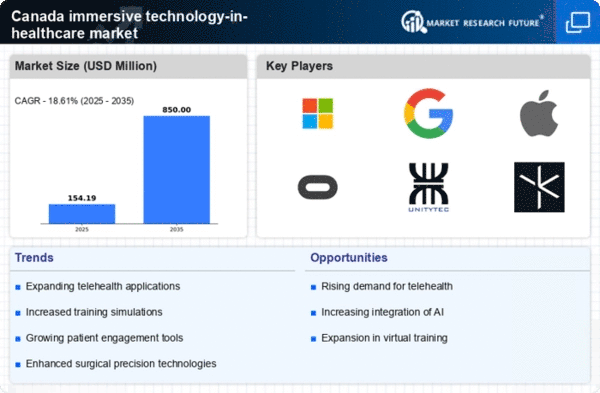Government Initiatives and Funding
Government support plays a crucial role in the growth of the immersive technology-in-healthcare market. In Canada, various initiatives are being launched to promote the adoption of advanced technologies in healthcare settings. Funding programs aimed at integrating immersive technologies into medical education and patient care are becoming more prevalent. For example, the Canadian government has allocated millions of dollars to support research and development in this field. Such investments not only foster innovation but also encourage collaboration between healthcare providers and technology developers. As a result, the immersive technology-in-healthcare market is expected to expand, driven by increased funding and supportive policies that facilitate the integration of these technologies into everyday healthcare practices.
Integration of Data Analytics and AI
The integration of data analytics and artificial intelligence (AI) is emerging as a key driver for the immersive technology-in-healthcare market. In Canada, healthcare organizations are increasingly leveraging data to enhance decision-making and improve patient outcomes. The combination of immersive technologies with AI capabilities allows for personalized treatment plans and predictive analytics. For instance, AI algorithms can analyze patient data to tailor VR therapy sessions to individual needs, thereby increasing their effectiveness. This synergy between immersive technology and data analytics is likely to create new opportunities within the market, as healthcare providers seek innovative solutions to optimize care delivery and enhance operational efficiency.
Rising Focus on Patient-Centric Care
The shift towards patient-centric care is significantly influencing the immersive technology-in-healthcare market. Healthcare providers in Canada are increasingly recognizing the importance of involving patients in their treatment processes. Immersive technologies, such as AR and VR, are being utilized to enhance patient education and engagement. By providing interactive experiences, these technologies help patients better understand their conditions and treatment options. This focus on patient involvement is likely to improve adherence to treatment plans and overall health outcomes. As healthcare systems continue to prioritize patient-centric approaches, the demand for immersive technologies is expected to rise, further propelling the growth of the immersive technology-in-healthcare market.
Technological Advancements in Healthcare
The rapid evolution of technology is a primary driver for the immersive technology-in-healthcare market. Innovations such as virtual reality (VR) and augmented reality (AR) are being integrated into medical training and patient care. In Canada, the healthcare sector is increasingly adopting these technologies to enhance educational experiences for medical professionals. For instance, immersive simulations allow for realistic training scenarios, which can improve skill acquisition and retention. The market is projected to grow significantly, with estimates suggesting a compound annual growth rate (CAGR) of around 30% over the next five years. This growth is indicative of the healthcare industry's commitment to leveraging advanced technologies to improve outcomes and efficiency.
Increased Demand for Remote Healthcare Solutions
The shift towards remote healthcare solutions is reshaping the immersive technology-in-healthcare market. As patients seek more accessible healthcare options, technologies that facilitate remote consultations and therapies are gaining traction. In Canada, the demand for telehealth services has surged, with a reported increase of over 50% in virtual consultations. Immersive technologies, such as VR therapy, are being utilized to provide remote treatment options for various conditions, including mental health disorders. This trend not only enhances patient engagement but also expands the reach of healthcare services, making them more inclusive. The immersive technology-in-healthcare market is likely to benefit from this growing demand, as healthcare providers invest in innovative solutions to meet patient needs.


















Leave a Comment